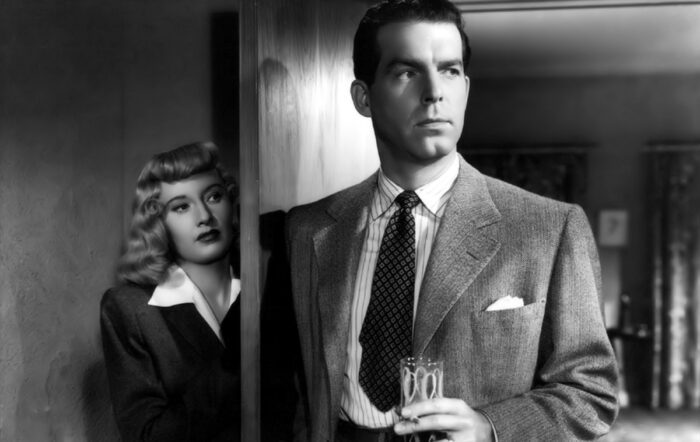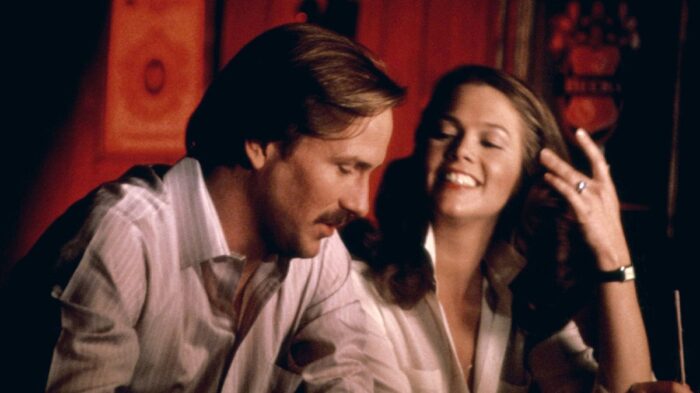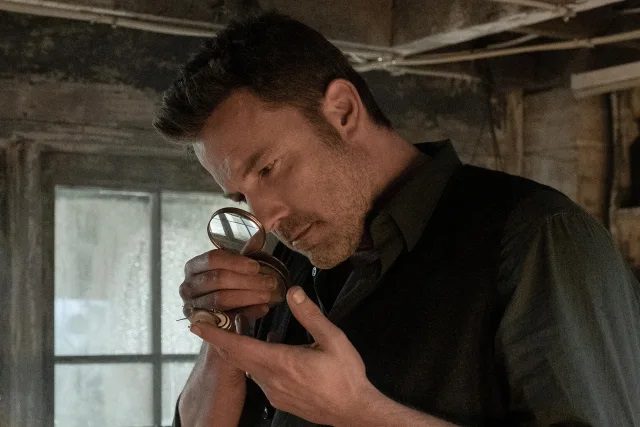This article contains spoilers for Deep Water. And for that matter, Double Indemnity and Body Heat.
Is it possible to watch Hulu’s recent Adrian Lyne-directed Deep Water, the “erotic thriller” as it’s been called, starring pandemic partners Ana de Armas and Ben Affleck, without thinking about its cinematic predecessors? I suppose some will, but the film’s deliberate echoes of earlier films noir and neo-noir has more than a few wondering what happened to the incendiary passions ignited by desperate lust in earlier eras.
1944’s Double Indemnity and 1981’s Body Heat, approximately four decades apart, and 2022’s Deep Water, another four decades hence, each feature a male protagonist willing to kill for sex, except in Lyne’s new film, it’s not the man whose lust drives the narrative. And while Body Heat took Double Indemnity’s sexual desire and amplified it tenfold, Deep Water’s protagonist’s greatest passion seems reserved for his musty, fetid snail farm, effectively neutering what might have been a thrilling reclamation of neo-noir’s now-latent eroticism.
Double Indemnity: A Crime of Passion
When Billy Wilder directed Double Indemnity in 1944, film noir was not yet a thing. The phrase had yet to be coined (French critic Nino Frank would do so, looking retrospectively at American postwar imports, in 1946), and the parameters of its now-unmistakable visual style were only just developing. But the film’s sordid ripped-from-the-tabloids tale of adultery and murder, its subtle and pulsing eroticism, and its dying-moments confessional narration—combined with the signature visual panache for which noir would come to be known—made Wilder’s film the best-known and most successful of the first wave of films noir.

So much about Double Indemnity worked so well. Casting nice guy Fred MacMurray and plucky working-class heroine Barbara Stanwyck largely against type. The touching tenor of Edward G. Robinson’s gruff paternal friendship. The gallows humor. The witty banter. And, especially, its sexual heat. From Walter Neff’s first glance of Phyliss Dietrichson’s sexy anklet to their later smoldering apartment rendezvous to their final, fatal clinch, Double Indemnity reminds viewers constantly that Neff’s is a crime of passion: his, for Phyllis, even after all available evidence suggests she’s been pulling his strings the whole while. Even the dictates of the Hays Code could not tamp down Double Indemnity’s considerable heat.
Body Heat: Turning Up the Temperature
Double Indemnity’s formula—affable dupe falls for sexy schemer who leads him into crime and eventual punishment—was one that worked for dozens of other films noir through the 40s and 50s, but by the end of that decade, noir’s time had largely passed. The neo-noirs of the 1970s—Dirty Harry, Chinatown, The Long Goodbye—were more concerned with their hard-boiled, world-weary protagonists’ investigations than with their sexual passions. That is, until Lawrence Kasdan’s 1981 Double Indemnity-influenced Body Heat, a film that borrowed its basic outline and archetypes and updated its eroticism for a post-Code, R-rated audience. Body Heat was not especially explicit—there’s little nudity and nearly no onscreen violence—but it smoldered nonetheless, characterizing its leads’ intense sexual desires as the film’s raison d’etre.
Starring then-nearly unknowns, certainly not bankable leads, Kathleen Turner and William Hurt, Body Heat doubled down on Indemnity’s sexual chemistry, slowly charting Hurt’s sweaty, seersuckered Ned Racine’s slow burn for Turner’s willowy, aloof Matty Walker. “Someday your d*ck is going to lead you into a very big hassle,” he’s forewarned in a classically Proppian interdiction. Driven to a blueballed frenzy by her intoxicating allure and those maddening wind chimes, Ned explodes with a passion he can’t contain, throwing a chair through her glass door to act on his lust—an outrageous moment that leads, ultimately, to his committing murder for her and eventual imprisonment.
In other words, his d*ck leads him into a very big hassle. So to speak.
Like Double Indemnity, Body Heat made the most of all the minor details. A great supporting cast (including a then-unknown Mickey Rourke as small-time arsonist). A vivid male friendship between Hurt’s Racine and Ted Danson’s dancing-D.A. Lowenstein, ultimately betrayed. A plot just complex enough to engage, but not confound. Clever dialogue. Even a pretty great d*ck joke, as far as those go, that lets Ned off the hook a little while longer. A starmaking turn from the recently, sadly departed William Hurt, who would for a time become as reliable a performer as anyone in the industry with one clever, complex performance after another and an eventual Academy Award winner. Not to mention the equally great Turner, who channeled the siren song—and sultry voice—of film femmes fatales of the past.

But more so than anything else, what Double Indemnity and Body Heat shared was an undeniable, uncontrollable passion. Certainly, both their male protagonists jonesed, and hard, for Phyllis and Matty respectively, the married women they wanted but thought they could not have. But Phyllis and Matty had their passions too, for Walter Neff and Ned Racine, even if both of them were simply necessary obligations on their paths to bigger scores. Both films were, simply, unafraid in depicting characters whose extreme passions for others led them to their doom.
As formulaic and recognizable as these two films are now, both were groundbreaking and risk-taking in their eras, opening the door for, as Double Indemnity did, dozens of femmes fatales and their distracted dupes or, as Body Heat did, more than a decade of steamy erotic neo-noir thrillers. Following in its wake in the ’80s and ’90s were dozens of films linking sex with violence. More recently, though neo-noirs have evolved into a variety of different hybrid genres in films like Brick, The Dark Knight, Drive, John Wick, and Nightcrawler, all of which evoke most of noir’s tropes—except, explicitly and obviously, sex.
For the most part, in fact, eroticism has nearly disappeared from neo-noir specifically and from the thriller genre broadly. Ours is, of course, a post-#MeToo world in which accounts of mistreatment by directors of actresses have likely curtailed depictions of sensuality in film. Today, most every set requires an intimacy coordinator overseeing sex scenes, and necessarily so. More generally, society seems to be trending away from discussions of sex, even as pornography is (no link here, sorry!) more freely and instantaneously available online, and a generation of filmgoers weaned on Marvel movies simply don’t expect to see sex in their superhero films. In other words, few look to film for anything erotic today.
Deep Water: Sex without Passion
Deep Water isn’t the first failed effort to reclaim the eroticism of the thriller. Just last year, Michael Mohan’s The Voyeurs featured hot young stars Sydney Sweeney (HBO’s Euphoria) and Justice Smith (Jurassic Park: Fallen Kingdom) as a voyeuristic couple eavesdropping, then fixating, on their neighbors’ sexually charged, apparently abusive relationship, in a convoluted plot that involves several explicit sex acts and absolutely zero passion from anyone. “You have a magnificent body,” one character tells the half-disrobed Sweeney, the days of double-entendre and witty banter being long gone. A film unsure whether it was an erotic thriller or a half-baled parody of the genre, Voyeurs sank like a stone.
So too, I think, will Deep Water, already backburned from a slated theatrical release to a streaming service. And with it, the erotic thriller genre itself.
Part of Deep Water‘s problem is the very lack of what made Double Indemnity and Body Heat so pleasurable: passion. But also, truth to be told, Deep Water is pretty poor filmmaking all around. Lyne, who so famously helped develop the subgenre with his 9-1/2 Weeks and Fatal Attraction, followed by the later Indecent Proposal and Unfaithful, relies so heavily on the perceived charisma of his stars Ben Affleck and Ana de Armas that neither of their characters, adapted somewhat freely from a 1962 Patricia Highsmith novel, seem to have real desires.
Of the two, de Armas’ Melinda Van Allen fares a bit better. Her character, at least, desires someone, something, other than the boredom of her husband and the marriage to which she has regretfully consigned herself. Melinda flirts with, initiates sex with, multiple characters in the course of Deep Water’s narrative, though does not exhibit any passion for any of them, just a desire to be something other than bored by her husband and their stultifying domesticity. I guess the Van Allens have not heard of polyamory. Or joint legal custody of their precocious child Trixie (Grace Allen).

Ben Affleck’s Vic Van Allen desires very little. He rides his bike with a passion. (He calls it a “mountain bike” but we never see him on one. Instead he rides a drop-bar gravel bike and a flat-bar hybrid. Both helmetless, because he’s Ben Affleck, whether in town or through the nearby bluffsides.) He’s retired, having made a lifetime’s income from his ethically-dubious drone technologies, and given only to the occasional chaste flirt with a townie. But even that interrupts his dedication to sullenly sulking about, staring constantly through windows and doorways at his wife’s in flagrante delicto seductions of her random boytoys.
His other passion—aside from the murders he casually commits because, we are given to understand, men have sex with his wife whom he can barely tolerate—is his snail farm. In fact, Lyne shoots Vic’s sensuous fondling of his snails with the same cinematic caress he shoots De Armas singing at a party. The snail farm doesn’t figure in the film’s plot, does little to characterize Vic, and fails to register at all thematically. (And by the way, a snail can be made to mean something. Ask Dalton Trumbo re: Spartacus.) As suspicious neighbor and story-seeker Don (Tracy Kidder) says: “You’re a weird guy, you know.” Affleck was reportedly adept at snail-handling, says the set’s animal wrangler. So Deep Water has that.

At one time earlier in their lives and long before the film’s narrative, Deep Water’s marrieds might have felt some passion, but it’s never onscreen. One brief moment of sex is smash-cut with their child’s soccer game—as if the sundry obligations of domesticity leave little room for passion—and another, much later, seems mutually pleasurable if curiously tame. But neither exhibits at any time any passion for the other, or for anything else, save maybe a bike ride or a snail farm.
In fact, for a thriller the film’s “thrill” is saved for one absurd action sequence in which Vic, on bicycle, chases Don, in his car, through the mountainside: it’s expertly shot and edited, and Vic achieves his goal by launching himself face-first into the direct path of Don’s speeding (twenty-year-old? How unsuccessful, or environmentalist, is he supposed to be, anyway?) Subaru, forcing his adversary to a death plunge into a ravine, effectively eliminating him as a threat, even if it took a face-plant into a tire’s path to do so.
Don lands in shallow water, just like Vic’s last victim had. And the one before. For a film that calls itself “Deep Water,” there is none. It’s perpetually shallow, just like the film itself, which drifts from one continuity-challenged, character-deficient sequence to the next. Pandemic couple-of-the-month De Armas and Affleck may have been able to entertain each other during the film’s making, but onscreen, unlike Double Indemnity and Body Heat, Deep Water’s characters literally loathe each other throughout the film. De Armas flirts and flits in relationships but ignites none of the passion of a Matty Walker.
In the end, Double Indemnity’s Walter Neff was intelligent and charismatic, his voice-over narration confessing gravely to his sins of passion. Body Heat’s Ned Racine could scarcely control his lust, driven to murder by the Florida heat, and Matty Walker’s fatal charms. In contrast, Deep Water offers us a former tech innovator, a friendless, passionless man whose greatest passion is nurturing a snail farm. Even if the erotic thriller is not yet dead as a genre, Deep Water is still tossing the body on the pyre.




